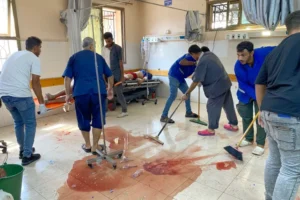Gaza is running out of blood

Medics clean the floor of blood as others care for Palestinians who were injured in Israeli fire while gathering near a food aid centre, at Khan Younis’ Nasser Hospital in southern Gaza on 17 June 2025
Donya Abu Sitta writes in Al Jazeera on 17 July 2025:
I live near Nasser Hospital in the west of Khan Younis city. Almost every day, I hear desperate calls for blood donations made on loudspeakers out of the hospital. It has been like that for more than a year.
The hospital, like other barely functioning health facilities in Gaza, has been regularly overwhelmed with victims of continuing Israeli air attacks. Since the end of May, it has also received many victims shot by Israeli soldiers at aid distribution sites.
I had donated blood before, and I felt it was my duty to do it again. So one morning last month, I headed to Nasser Hospital. While the blood was being drawn from my arm, I felt severe dizziness, and I thought I was going to faint. My friend, Nurse Hanan, who was one of the workers in the blood donation campaign, rushed to me and raised my legs to increase the blood flow to my brain until I felt better. She went to test my blood, and after 10 minutes returned to tell me that I was suffering from severe anaemia and malnutrition. My blood did not contain the minimum nutrients necessary for donation.
Hanan told me that my case was not an exception. She explained that most of the people who visited the hospital to donate blood suffer from anaemia and malnutrition as a result of the ongoing Israeli blockade and the absence of nutritious food, such as meat, milk, eggs and fruits. Two-thirds of the blood units donated at the hospital have extremely low haemoglobin and iron levels, which makes them unusable for blood transfusions.
In early June, Dr Sofia Za’arab, director of the Laboratory and Blood Bank, told the media that the severe shortage of donated blood units has reached “critical” levels, threatening the lives of patients, many of whom require urgent blood transfusions. The whole of Gaza needs 400 units daily.
“Despite contacting the Ministry of Health in the West Bank to transfer blood units, the occupation authorities prevented their entry [into Gaza],” Dr Za’arab said.
After the failed blood donation, I returned home crushed. I knew the famine was affecting me. I have lost a lot of weight. I suffer from constant fatigue, chronic joint pain, headaches, and dizziness. Even when I write my journalistic articles or study, I need to take short breaks.
